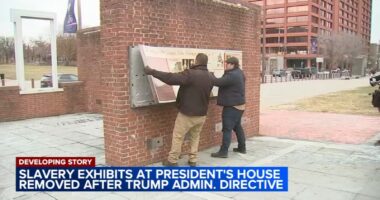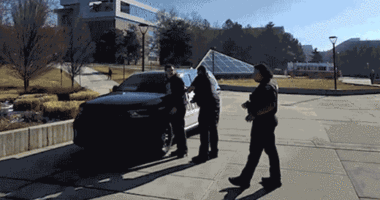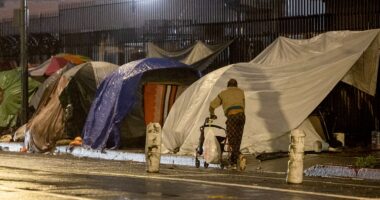Share this @internewscast.com
On Friday, several demonstrators opposing ICE were detained at Minneapolis-St. Paul International Airport (MSP) after braving the cold to urge airlines to oppose federal immigration enforcement.
Faith in Minnesota, an organization advocating for racial and economic justice, shared footage on social media showing what they claimed to be the arrest of over 100 clergy and faith leaders.
Protesters were observed kneeling in a line as officers escorted them individually to a bus bound for jail.
The group stated, “In -20° weather, over 100 clergy and faith leaders were taken into custody at MSP Airport as they engaged in peaceful, prayerful protest, urging airlines—particularly Delta and Signature Aviation—to align with Minnesotans and declare #ICEOutOfMN… This must stop.”

An individual is apprehended by police during a demonstration at the Minneapolis-Saint Paul International Airport amid an increased presence of federal immigration authorities in St. Paul, Minn. (Brandon Bell/Getty Images)
Authorities have yet to confirm the exact number of those arrested.
Faith in Minnesota alleged more than 2,000 deportations have run through the airport, claiming MSP employees have been detained by ICE at work and while commuting.
The Metropolitan Airports Commission told affiliate FOX 9 Minneapolis it “worked in advance with event organizers to best accommodate their right to freedom of expression while also ensuring uninterrupted operations at MSP Airport.”

Anti-ICE protesters line up after being detained during a demonstration at the Minneapolis-Saint Paul International airport. (Brandon Bell/Getty Images)
The approved demonstration permit limited where protesters could gather and how many could attend, in order to maintain public safety, according to FOX 9.
“When the permitted activity went beyond the agreed-upon terms, MSP Airport Police began taking necessary action, including arrests, to protect public safety, airport security and access to Terminal 1,” the commission told FOX 9.
Meanwhile, unlawful protests broke out at the Whipple Federal Building, where demonstrators gathered following the Jan. 7 fatal shooting of Renee Nicole Good by an ICE agent, prompting a dispersal order from the Hennepin County Sheriff’s Office and assisting agencies.

Protesters attend a demonstration at the Minneapolis-Saint Paul International airport amid a surge of federal immigration authorities in the area in St. Paul, Minn. (Brandon Bell/Getty Images)
“Deputies have been on the ground for the last few hours and made several attempts to ask protesters to unblock an access road,” the sheriff’s office wrote in a statement on X. “The group was clear that they will not unblock the road. Deputies have explained what will happen if they do not comply with the lawful orders. We’ve given them time to move.
“There have been ice chunks thrown at multiple vehicles, breaking windows. Deputies have given three dispersal orders for an unlawful protest. Individuals who do not comply with orders and those who continue unlawful behavior have been and will continue to be arrested. Please avoid the area.”
A march is scheduled in downtown Minneapolis on Friday afternoon as part of “ICE Out of Minnesota: A Day of Truth and Freedom.”
Hundreds of businesses closed, citing support for those detained by ICE, according to FOX 9.
















